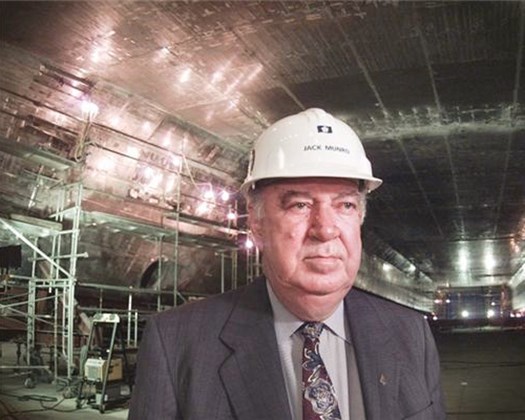He was loud, gruff and larger than life, a leader from another era whose speech was as profanity-laden as it was at times politically incorrect.
But labour leader Jack Munro was also a straight shooter who said what he thought and stood up for the workers he represented as head of the IWA forestry union in the 1970s and 1980s.
"He was a trade unionist. He was for the working class," said Rod Mickleburgh, a former labour reporter for the Globe and Mail who covered Munro throughout his career. "There was no surrender or backing down by Munro."
Munro, who lived in West Vancouver, died Friday at 82.
"He just dominated events. He was big and he was loud and he was often profane," said Mickleburgh. There were frequently "more 'God damns' and 'hells' than nouns in his sentences."
Munro led the powerful IWA union at a time when forestry was king in the province and labour issues were big news.
West Vancouver Coun. Bill Soprovich met Munro several times after Munro retired and was well aware of his legacy. Soprovich's own father had been a union president in the 1950s.
Living through the Depression, the Second World War and hard times growing up helped shape who Munro became, said Soprovich.
Both Munro and his father "saw a situation where the blue collar worker was not getting what they should," said Soprovich. "He brought the trade unions into society."
Among Munro's more controversial acts was his decision to fly to Kelowna and work out a deal with then-premier Bill Bennett after the Solidarity movement locked horns with the province over the prospect of a general strike in 1983.
Mickleburgh said he thinks Munro was unfairly blamed for that agreement - denounced by some as selling out.
Munro also provoked angry reactions from environmentalists when he famously said, "I tell my guys if they see a spotted owl to shoot it."
He was also known for his reactionary stance on issues like feminism and gay rights.
"He was not socially progressive," said Mickleburgh. "It took him a long time to understand that things were changing."
Craig Keating, City of North Vancouver councillor and newly elected president of the B.C. NDP, said Munro was the face of labour in the province for many years.
Munro's message that "working people needed a fair shake," is still an important one, Keating said.
In his later years, Munro pursued hobbies, which included growing roses and riding his Harley Davidson motorcycle.
Munro also dedicated the last decade of his life to trying to preserve the history of labour in the province. "That was really big to him," said Mickleburgh. "That the workers' story should be told."



